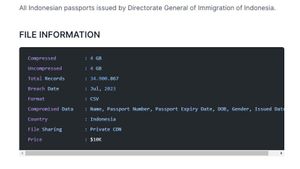JAKARTA - The Canadian government will stop buying ads on Facebook and Instagram in response to a dispute over a new law requiring payments to online news publishers opposed by Meta's platforms. This was conveyed by Heritage Minister Pablo Rodriguez on Wednesday, July 5.
The online news law, or Bill C-18, was passed into law last month, which led Meta and Google to state that they would discontinue news access on their Canadian platforms.
The government is drafting a regulation requiring these platforms to share part of advertising revenue when the law is implemented at the end of this year.
"Canada will remain steadfast and ensure that if social media platforms and internet giants want to use the media, they have to pay proportionally," Prime Minister Justin Trudeau said in Monterroregie, Quebec.
"The government is still seeing the possibility of resolving this dispute and it is open to discussing with the platforms," Rodriguez, who introduced the law, told reporters at Ottawa.
The law came after Canada's media industry called for stricter regulations against internet giants so that news businesses could cope with financial losses experienced in recent years when Facebook and Google acquired a larger share of the online advertising market.
Rodriguez said that 80% of all ad revenue in Canada, or nearly 10 billion Canadian dollars (Rp113 trillion) by 2022, was awarded to Google and Facebook, and the Liberal government wants both platforms to contribute to domestic journalism.
"The decision to stop government advertising will have an impact of around 10 million Canadian dollars per year on Facebook and Instagram," Rodriguez said.
"Facebook itself has refused to discuss and they do not want to compensate according to the media, therefore we decided to stop advertising," added Rodriguez, who spoke with two of Canada's three opposition parties who also support the law.
Meta previously said that news had no economic value for the company and that news organizations benefited by sharing their reports on Facebook.
"Unfortunately, the regulatory process does not allow changes to the fundamental features of the laws that have always been a problem," a Meta spokesperson said, adding that the company plans to stop the availability of news in Canada "in the coming weeks."
另请阅读:
Rodriguez sounds more optimistic in reaching an agreement with Google, saying the government believes that "what Google is asking for right now can be done." Google, which has proposed a change to the law that was rejected, said last week that "the government's regulatory process is unlikely to resolve any'structural issues' with the law." The company did not comment on Wednesday.
The result of Canadian disputes with internet giants could be a reference for other governments trying to regulate internet companies. If these companies fail to get exemptions or change regulations in Canada, they may face a similar fate in the United States.
US Democratic Senator Elizabeth Warren, who was one of the leading progressive carriers, on Wednesday July 5 expressed support for Canada, saying that "leaders are steadfast in opposing these tactics and rejecting Big Tech's free treatment of local news."
Earlier on Wednesday, Canadian telecommunication operators, Quebecor, and Cogeco, which operate radio stations in Quebec, also announced that they would stop advertising on Facebook and Instagram due to Meta's rejection of the new law.
The English, Chinese, Japanese, Arabic, and French versions are automatically generated by the AI. So there may still be inaccuracies in translating, please always see Indonesian as our main language. (system supported by DigitalSiber.id)
















